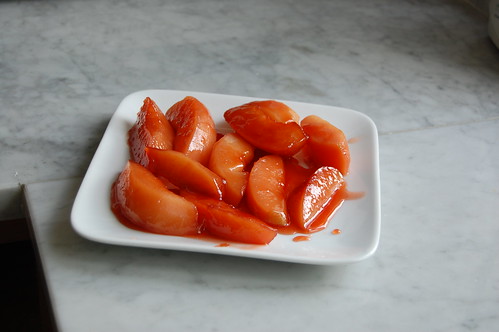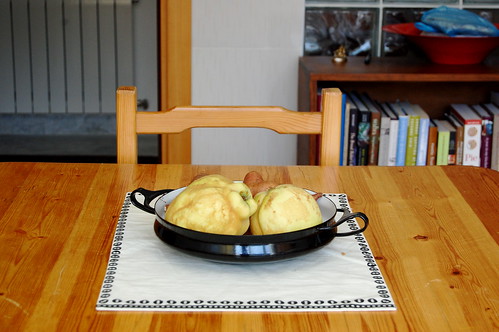
Quinces look like big gnarly very hard apples. We see them growing on trees in our neighbor's yard, hanging heavily on branches, and for sale in the markets in the last few weeks. In the past, my attempts to cook quinces have always been rather disastrous, perhaps because of poor recipes or user error, or perhaps also because of the poor quality of American quinces. They always turned out mushy and I would just end up pureeing them into a big batch of membrillo (Spanish quince paste).
Paul was out of town a few weeks ago and I went a little quince crazy. Having purchased several of them, I poached and roasted them in a variety of ways. The poached quinces came out perfectly, tender but not mushy, the perfect golden hue, they reminded me of the wonderful quinces we had in Istanbul, though slightly less sweet. Like in Istanbul, we ate them with whipped clotted cream and a sprinkle of pistachios on top. This recipe makes a great baseline for other concoctions - think of sauteed pork chops with quinces, or a quince tart. And in our next post we'll talk about a quince and pear pie (just in time for Thanksgiving!).

Poached Quinces
Quinces are very hard, so it's important to be careful and use a very sharp heavy-weight knife to cut them - if you're using a dull knife it could slip and injure you. Adapted from David Lebovitz.
6 cups water
1 cup sugar
3 tablespoons honey
4 large or 5 medium quinces
the juice of 1 lemon
optional spice additions: 1 vanilla bean, or 2 star anise plus a cinnamon stick
equipment: parchment paper
1. Place water, sugar, honey, lemon juice, and spices in a large pot and bring to a simmer.
2. Meanwhile, peel the quinces,cut them into eights, and cut out the hard center pit of each section. Slip each quince slice into the poaching liquid as you work. This will prevent discoloration of the quinces.
3. Once all the quince are in the pan, cut a round of parchment slightly larger than the top of pot, cut a small hole in the middle of the parchment and place over the just-simmering pot of liquid.
4. The cooking time can vary greatly depending on the size and quality of your quinces - you want them to be rosy colored and tender but not falling apart. It should take at least two hours, mine took about 3 hours. Check on the pan occasionally.
5. When the quinces are done remove them from the pot to a plate, and let any remaining liquid boil down to a light syrup (it will thicken significantly as it cools). Pour the syrup over the quinces and let cool to room temperature. Keep covered in the fridge, keeps 1-2 weeks.






No comments:
Post a Comment